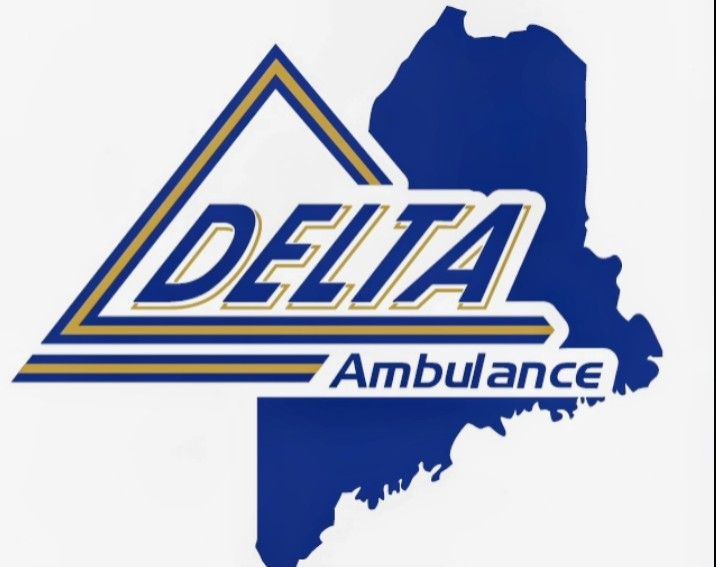CHINA: Delta Ambulance: No one has enough resources
 by Mary Grow
by Mary Grow
“No one has enough resources.”
That was Delta Ambulance Executive Director Chris Mitchell’s summary toward the end of a Sept. 17 discussion with representatives of emergency services and local governments from towns Delta serves. The meeting was the first of two hosted by the Town of China; the second was Sept. 23.
Mitchell gave participants copies of Delta’s 37-page strategic plan for 2026 and his four-page summary of highlights, and answered numerous questions.
The resources that are lacking, Mitchell and audience members said, include trained personnel to provide emergency medical care, especially paramedics; ambulances; and money to compensate personnel and buy and maintain vehicles.
To make up for expenses outstripping revenues, in July 2023 Delta began charging towns it serves annual fees, based on population. As expenses continue to mount, the fees increase, to the point where Waterville and Winslow have established their own ambulance service and other area towns are weighing the option.
One of Mitchell’s projections was that if all 13 current member towns stay with Delta, the 2026 fee will be between $55 and $60 per capita. The 2025 fee is $35, up from $25 in 2024.
If any towns decide to leave, the remaining towns’ fees would increase even more.
The strategic plan summarized proposed changes aimed at reducing costs while improving service, primarily by 1) better matching ambulance coverage with demand, in terms of timing – daytimes are busier than overnight – and need – the majority of emergency patients do not need a paramedic’s skills; 2) revising cost allocations; and 3) increased coordination with towns’ emergency services.
Mitchell scheduled the September meetings to give town officials time to consider options before beginning 2025-26 budget deliberations. He intends additional meetings as needed, and welcomed questions between meetings.
Delta Ambulance is legally a nonprofit organization, established in 1972, the strategic plan says. As of July 2025, it serves 13 towns, covering almost 522 square miles, with a population of almost 42,000. Its job is to provide “emergency and non-emergency medical transportation” to the towns it serves.
The plan shows that Delta is nonprofit in fact as well as in law. In 2024, the plan says, total revenue was about $7.9 million, two-thirds from ambulance billing. Town subsidies contributed about 13 percent, funding from hospitals about 12 percent.
Total 2024 expenses were about $8.4 million, three-quarters for staff salaries and benefits & FICA. The second largest expense category was vehicles, about 11 percent\ of the total. The document’s writer observed that insurance cost almost $500,000.
Delta is the primary emergency transport provider for the 13 towns. Additional services include “secondary/mutual aid to adjacent communities”; transfer service between medical facilities, mostly but not entirely local; “scheduled wheelchair van service to patients”; “medical billing services to outside agencies”; and “education and support to community members and partnered first responder agencies.”
Since Delta’s policy is to make sure at least two ambulances are always available for emergency calls, transfers sometimes must be postponed. When Daniel Mayotte, from Vassalboro’s First Responders, pointed out that a transfer can be a life or death issue, Mitchell agreed and said Delta would call for mutual aid or LifeFlight of Maine. If no option was available, however, a patient in a hospital would have to be a lower priority than potential patients with no care.
Delta currently has 31 paramedics, 17 of them full-time, and 42 EMTs (Emergency Medical Technicians) and AEMTs (Advanced Emergency Technicians), 26 full-time. Mitchell said four AEMTs are working toward becoming paramedics.
There are 15 administrative positions. Most of the people in them, including Mitchell, are qualified to staff an ambulance, and do.
Of the seven front-line ambulances Delta runs, Mitchell said two are new this year, with two more new ones due this fall and winter. Older ones, some with close to 400,000 miles on their odometers, will be retired.
Delta’s main headquarters is in Waterville, with a secondary base in Augusta. The latter used to belong to Delta; now it is leased, as a cost-saving measure.
Second meeting
At a second regional meeting in China on Sept. 23, Delta Ambulance Executive Director Chris Mitchell updated some of the information he provided the previous week and answered more questions from a partly new, partly repeat audience.
One change: Delta now has 36 paramedics, up from 31 a week ago, and 45 EMTs (Emergency Medical Technicians) and AEMTs (Advanced Emergency Medical Technicians), up from 42 a week ago.
Mitchell re-explained the projected 2026 price increases to the 13 towns Delta serves, and assured a questioner that hospitals, too, will be asked to pay more for having patients transported from one facility to another.
He repeated his prediction that with 13 towns, the 2026 fee will be $55 to $60 per capita, up from $35 in 2025. Fairfield and Benton officials are considering withdrawal; if those two towns stop using, and contributing to, Delta, Mitchell projected an approximately $75 per capita fee for the remaining towns.
Emergency services and inter-facility transport are two separate services Delta offers; costs are divided. Both require cooperation with other emergency services, Mitchell again emphasized.
As Delta’s fee increases, town officials are considering whether it might be less expensive to start individual ambulance services. The Sept. 23 consensus was probably not yet.
With hindsight, Mitchell said, Delta should have started charging fees years ago, instead of waiting until 2023, after effects of Covid, price increases and other factors sent the service into annual deficits.
A year ago, he said, he was asked what happens if Delta loses so much support that the service fails. His answer now: Delta does not plan to fail, but to recover, through more efficient use of its resources and with help from hospitals and municipalities.
Mitchell said the problem is national, leading to questions about federal financial help, including increasing the Medicare rates on which insurance companies base their reimbursement rates.
So far, Congress had shown no interest, audience members said. A federal EMS (Emergency Medical Services) advisory board that advised the federal Department of Transportation has been inactivated.
Mitchell promised China Town Manager Rebecca Hapgood he will give town officials a firm figure for the 2026 fee by the time budget discussions begin in January 2026, even if some towns are still debating whether to stop using the service.
Responsible journalism is hard work!
It is also expensive!
If you enjoy reading The Town Line and the good news we bring you each week, would you consider a donation to help us continue the work we’re doing?
The Town Line is a 501(c)(3) nonprofit private foundation, and all donations are tax deductible under the Internal Revenue Service code.
To help, please visit our online donation page or mail a check payable to The Town Line, PO Box 89, South China, ME 04358. Your contribution is appreciated!





Leave a Reply
Want to join the discussion?Feel free to contribute!